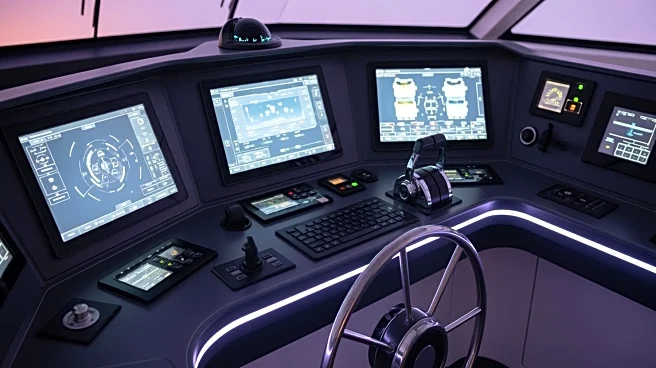What's Happening?
Christopher J. Wiernicki, Chairman and CEO of the American Bureau of Shipping (ABS), emphasized the importance of decisive leadership in the evolving Maritime 5.0 world during his keynote address at the North
American Marine Environment Protection (NAMEPA) Awards. He highlighted the rapid changes driven by artificial intelligence, advanced fuels, and digital ecosystems, stressing that leadership must be clear and safety-first to navigate these complexities. Wiernicki outlined a playbook for success that includes a focus on performance improvement and the adoption of transformational technologies such as AI, nuclear energy, green hydrogen, carbon capture, and battery storage. He also received a Lifetime Achievement Award for his contributions to maritime innovation and safety.
Why It's Important?
The Maritime 5.0 era represents a significant shift in the shipping industry, with technology and environmental considerations at the forefront. Wiernicki's emphasis on leadership and strategic adoption of new technologies is crucial for industry stakeholders aiming to maintain competitive advantage and ensure safety. The focus on transformational technologies aligns with global efforts to reduce carbon emissions and enhance sustainability. Industry leaders who act decisively in integrating these technologies can potentially drive significant advancements in efficiency and environmental impact, benefiting both the industry and broader society.
What's Next?
As the maritime industry continues to evolve, stakeholders are expected to increasingly focus on integrating the identified transformational technologies into their operations. This may involve strategic investments and partnerships to leverage AI, nuclear energy, and other innovations. The industry will likely see increased collaboration between organizations like ABS and NAMEPA to further advance safety and sustainability initiatives. Leaders will need to continuously adapt their strategies to align with technological advancements and regulatory changes, ensuring resilience and long-term success.
Beyond the Headlines
The shift towards Maritime 5.0 not only impacts operational strategies but also raises ethical and cultural considerations. The adoption of AI and advanced technologies necessitates discussions around data privacy, cybersecurity, and workforce implications. As the industry embraces these changes, there will be a need for new skill sets and training programs to prepare the workforce for future challenges. Additionally, the focus on sustainability and environmental impact may drive cultural shifts within organizations, prioritizing eco-friendly practices and corporate responsibility.










